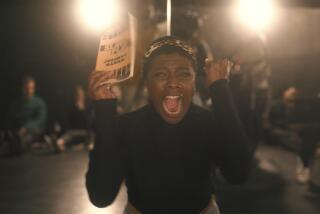A Retelling of History : Pin Points Theatre Performs to Enlighten Public About Little-Known Contributions by Blacks
Perhaps if Arnold Toynbee had seen a play by Pin Points Theatre, his theories about black people would have been different. “When we classify mankind by color,” the famous historian once wrote, “the only one of the primary races . . . which has not made a single creative contribution of value to any of our 21 civilizations is the black race.”
To the members of Pin Points Theatre, Toynbee couldn’t be further from the truth. To prove it, the group has created a series of plays that present audiences with what the troupe says is the true history of black people, a history rich in accomplishments in every human endeavor.
“Our job is to enlighten and inform the masses as to what has been kept out of the history books,” said actress Jennifer Jones, who has performed with Pin Point for nearly three years.
“It’s very important that all Americans . . . understand that we have made vast contributions to the human race, in technology, math, science, across the board--not just in entertainment and sports. Our greatest contributions to the world are of the intellect.”
The group, which incorporates Toynbee’s infamous quote in its presentation, tours nationwide presenting plays on African American history at schools, military bases and community theaters. Laced with humor and peppered with music and dance scenes, the plays shatter the myths of black inferiority “and the negative images that have been portrayed by the media,” said Ricardo Hill, the group’s director.
“We call it edu-tainment. People have a lot of fun with it without realizing that they’re learning history,” Hill said.
Founded by writer and director Ersky Freeman, Pin Points Theatre started in Washington, D.C., in 1978 as a writer’s workshop.
“Since many of the people were somehow involved in education, we kind of evolved into an educational theater,” Freeman said. In 1989 the group expanded to the West Coast with a branch in North Hollywood headed by Hill.
The group just finished its busiest season of the year, Black History Month, with 60 performances, Freeman said. During this time of the year, members see clearest the need for groups such as theirs.
Because the accomplishments of people of African descent--from Egyptian mathematicians and pyramid builders to African American inventors--are not taught in schools, Pin Points’ plays usually are greeted with surprise.
“People just don’t know, and each time we go to a different state and a different city it’s the same thing,” Hill said.
In the play “1,001 Black Inventions,” actors tell the stories of African American pioneers Dr. Daniel Hale Williams, the first physician to successfully perform open-heart surgery; Jan Ernst Matzeliger, who invented a shoe-making machine; Garret Morgan, who invented the traffic signal, and others.
“That’s not in the history books,” Hill maintained and many teachers simply don’t know.
As a result, students are often left with the impression that only one African American has contributed anything of merit to American society or world civilization, Hill said.
“Black history is Martin Luther King,” Hill said. “They’ve just been so inundated with Martin Luther King they don’t know anything else. . . . He’s basically been reduced to this starry-eyed dreamer.”
In the “Meeting,” a play by Jeff Stetson about a fictional encounter between King and Malcolm X, the group presents a more realistic picture of King and Malcolm X, who, Hill said, has been wrongly “portrayed as this demagogue, whose main thrust was violence.”
Instead, Hill said, Malcolm X simply believed in “uplifting black people, instilling a sense of pride.”
“When Will We Ever Use This Stuff?” explains the relevancy of school subjects in a youngster’s life, Freeman said. Other plays, sometimes commissioned by museums such as the Smithsonian Institution, explore the life of a particular African American or social issues such as drug abuse and AIDS. The troupe currently has three plays in its repertoire.
At North Hollywood High School, students who viewed “1,001 Black Inventions” recently during an African American history month celebration, were surprised by the information.
“I knew that there were black inventors but not so many,” 17-year-old Morris Arnwine said after viewing the play.
Jean Roquemore, 18, knew about many of the accomplishments but said the play was a revelation for her classmates.
“I think it opened a lot of people’s eyes,” she said. School counselor Yvonne Garrison, who organized the celebration, hoped the play would inspire students and help foster respect among the school’s many ethnic groups.
“It’s important for the self-esteem of African American students,” Garrison said. “But it’s also important for people of other races to let them know that African Americans have made a true contribution.”
Becoming a part of Pin Points Theatre takes more than just acting ability, Freeman said. Selection of new members is based “on a performer’s commitment to an idea rather than a particular talent,” he said.
“Most performers have a thrust to perform for sitcoms or be in movies,” he said. “It’s not necessarily important that they present a positive image of Africans and African Americans.”
But Pin Points performers must share the goals of the group’s founders. Often the actors and actresses come from other fields and use their skills in researching and writing the plays, Freeman said. Different versions of the plays are written to appeal to either an older or younger audience.
For the 45 actors in the group, the performances are a way to share with others information that they themselves failed to receive while in school.
Actor Kenny Fisher, 29, was so mis-educated that he “wanted the South to win the Civil War,” he said, reflecting on his childhood in Virginia.
“It makes me want to cry sometimes when I think of the things I learned in school,” he said. “Before I did the play I didn’t even know who Jan Ernst Matzeliger was.”
Actress Suzette Craft, who grew up in Torrance, learned about people of various ethnicities at home but was taught little about other groups in school.
“Multicultural education is so important, especially in Los Angeles,” Craft said. In the discussions with students after the play, members use the historical figures to show students “they can be anything” regardless of the restrictions placed on them.
And at a time when good scripts are hard to come by, the group offers performers the opportunity to portray positive figures “as opposed to being a drug dealer in a movie or a pimp,” said actor Mark Brown, 27, who plays an assistant to scientist and inventor George Washington Carver in “1,001, Black Inventions.”
“This is fulfilling” and gratifying, Brown said.
Although Pin Points was recently given a $20,000 award for excellence by the D.C. Commission on the Arts and Humanities, the group receives “very few grants” and operates primarily on the fees paid by schools, Freeman said. Its following is faithful but limited.
“We have underground fame,” Freeman said. “. . .Like teachers, we’re not going to be that popular or well-known. You won’t see us on Broadway, but we’ll always be doing something we consider significant rather than just entertaining.”
More to Read
The biggest entertainment stories
Get our big stories about Hollywood, film, television, music, arts, culture and more right in your inbox as soon as they publish.
You may occasionally receive promotional content from the Los Angeles Times.










